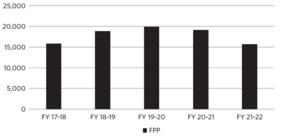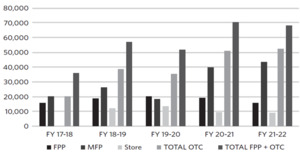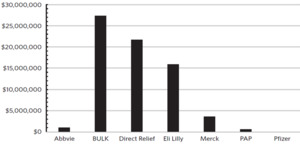History
It is well known that paying for medications can be a barrier to adherence for many people.1,2 Alleviating this barrier can lead to better health care outcomes by improving the medical management of many conditions, including heart disease, diabetes, and asthma.3,4 In 1997, the Mecklenburg Medical Society Alliance in North Carolina started MedAssist of Mecklenburg as a way to serve senior adults in the county who were uninsured or had low incomes. The program was expanded in 2005 to include all adults in the county. In 2009, the Free Pharmacy Program (FFP) was expanded to cover all eligible North Carolina residents and the name was changed to NC MedAssist to portray this shift.5
NC MedAssist programs were expanded to provide over the counter (OTC) medications in 2012. Originally, the OTC Program was only provided in Charlotte; however, in 2014 the organization began providing OTC medications across the state through the Mobile Free Pharmacy Program (MFP). Additionally, the OTC Free Store opened in Charlotte in 2018 as a way to access OTC medications in person and was staffed by members of a new Transitional Jobs Program. With the onset of the COVID-19 pandemic in 2020, NC MedAssist began offering individuals the opportunity to pre-order OTC items online, to be dispensed at the free OTC Store and at MFP events. NC MedAssist’s 2022 annual report provides a snapshot of the programs and services offered to provide medications to those to those in need in North Carolina.6
Background
The mission of NC MedAssist is to “dispense opportunities through improved health”.7 This mission began with the understanding that medication adherence can lead to better health outcomes and reduced medical costs, as noted in Sokol’s seminal 2005 study.8 Since then, many other publications have demonstrated this relationship.3,4,8–15 One study conducted by Allaire and colleagues with Dispensary of Hope, a nonprofit distributor of free medications, found that medication adherence decreased inpatient hospitalization stays and per-person annual costs for one of its associated health care systems.15 These results were significant for patients with a higher number of comorbidities, demonstrating the importance of ensuring medication adherence, especially in those with multiple disease processes.15
For those who are uninsured or have low incomes, spending money on medications may not be a feasible option. The “free pharmacy” model, such as the one utilized by NC MedAssist, covers up-front costs of medications to avoid higher long-term costs of care as a result of non-adherence. Lloyd and colleagues (2019) estimated a savings of over $13 billion for Medicare if just 25% of their non-adherent clients became adherent to the medical course of treatment.10 The cost of the medications to treat or prevent medical complications would be far less than the cost of care for untreated conditions. It is well known that health insurance programs help to cover some of the costs of medication therapy for many individuals. North Carolina’s decision to expand Medicaid will decrease the number of uninsured in North Carolina by approximately 600,000.16 However, this expansion only covers those who are at 138% of the Federal Poverty level or less.17 There will still be a need for free pharmacy programs like NC MedAssist to provide services to those who do not qualify under Medicaid expansion or other health insurance programs.
The Role of NC MedAssist
Through funding received from numerous sources including grants, federal support, and individual/corporate donors, NC MedAssist provides free medications to eligible participants across North Carolina. In 2022, this resulted in an estimated $125 million in economic benefit to the state.6 While the number of patients served by NC MedAssist has steadily increased over the years, there were slight decreases after the start of the COVID-19 pandemic (Figure 1). This decline was also seen at other charitable clinics across the state as a result of the pandemic.18,19
Eligibility for NC MedAssist includes uninsured North Carolina residents who are at or below 300% of the Federal Poverty Level.7 Once eligibility has been established, prescriptions are filled from NC MedAssist’s extensive formulary for conditions such as diabetes, heart failure, depression, and many other disease processes.20 Through the Free Pharmacy Program, postal delivery of prescription medications ensures timely access to needed therapies. Furthermore, OTC medications are available through the NC MedAssist store or through MFP events.21 Providing medications such as acetaminophen or ibuprofen to those who could not otherwise afford them may help to reduce emergency or primary care visits. These products are usually received from donors and area organizations.
Since the organization’s inception, NC MedAssist has provided an estimated 375,000 North Carolina residents with free medication via the OTC and FPP programs. In 2022, 15,748 patients received medications from the free pharmacy program, and 52,483 received OTC medications. A total of 68,201 individuals/families were served across the state in 20226 (2023 data are still pending as of this writing) (Figure 2). Patient referrals come from a variety of sources. Nearly 70% of patient referrals to NC MedAssist come from Partners of Hope, a network of over 100 clinics or safety-net organizations located throughout the state of North Carolina addressing gaps in care or social determinants of health.
Conclusion
The growth and success of NC MedAssist could not have been possible without the financial support from grants and donors, volunteer assistance, and partnership organizations (Figure 3).6 Continued support is needed for current programs, as well as new services like the tobacco cessation program. More research is needed to show the impact of a free pharmacy program on health care cost avoidance and patient health outcomes.3,4,15 As the only free pharmacy program in North Carolina, NC MedAssist provides essential services and acutely needed medications to thousands of people across the state each year.
Acknowledgments
The authors have no conflicts of interest to declare. All co-authors have seen and agree with the contents of the manuscript, and there is no financial interest to report.






